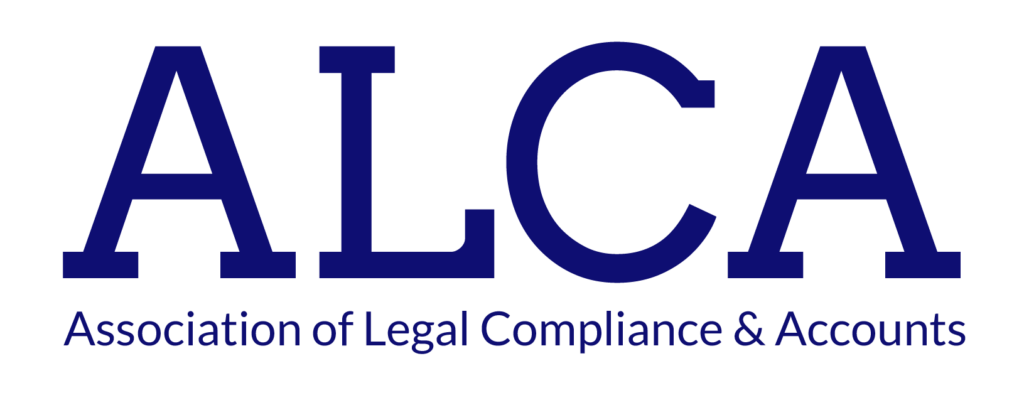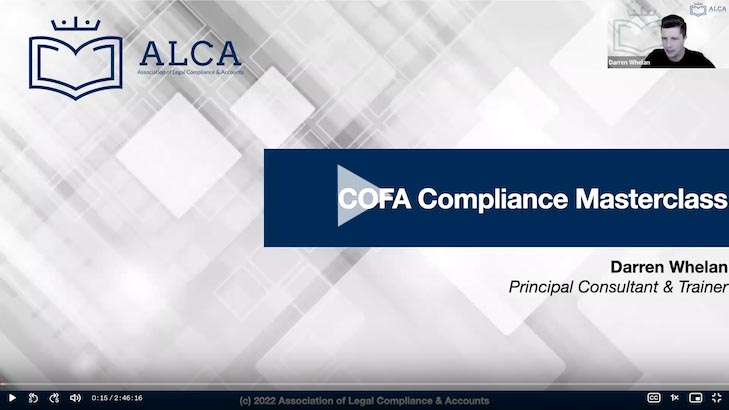COFA Compliance Masterclass
Speaker: Darren Whelan
Length: 2.5 Hours
Published November 26, 2022
Last Updated on May 1, 2023
Who is this training for?
This on demand workshop is for Solicitors, Lawyers, Accountants, Compliance Officers, COFA’s, Legal Accounts Professionals and anyone that has any involvement in working in legal finance and compliance.
Purpose of this training?
Since January 2013, the Compliance Officer for Finance and Administration (COFA) has had significant responsibility for ensuring firm’s meet their regulatory obligations and compliance with the SRA Accounts Rules and that any breaches of the SRA Accounts Rules are documented and reported back to the SRA. In addition to the COFA’s role in relation to the SRA Accounts Rules, the COFA has a duty under the SRA Code of Conduct for Firms to report to the SRA when the practice is in serious financial difficulties. The role of the COFA comes with personal liability.
This on demand workshop will cover the regulatory obligations of the firm, individuals within the firm and the key role of the COFA.
- The background and role of the COFA
- The SRA Standards and Regulations
- COFA responsibilities, record keeping and reporting concerns
- Codes of Conduct – for firms and individuals
- Business Management – Compliance and Business systems
- Assessing risk
- SRA Accounts Rules
- Cooperation and accountability
#1. Your firm is instructed by the landlord of a new development of commercial properties to prepare the lease agreements. You’re also instructed to receive, and hold in client account, the rental deposits that are paid by the tenants. These will be held until the lease comes to an end and any conditions, e.g. dilapidations, are met.
Is this a breach of the SRA Accounts Rules?
#2. Rule 1.5 of the Transparency Rules states that certain costs information must be included in the information on the website. Which one of the following does not have to be included in that information?
#3. The SRA has stated that it will take a more robust approach towards fines for persistent offenders in regard to the Transparency Rules. What is the maximum amount the SRA can fine a law firm?
#4. You have instructed an interpreter in order for your client to be able to communicate with you or to enable your client to understand Court proceedings. The cost of the interpreter is being passed on to the client. When billed, the cost is:
#5. Is it permissible to issue the client with a bill of costs for an unpaid, not yet incurred, disbursement?
#6. The SRA Accounts Rules require a business/office account to be reconciled?
#7. You have paid a disbursement from the business account and now have sufficient money held in the client account towards it.
Are you required to send the client a bill or other written notification of costs prior to transferring the money from the client account to the business account?
#8. Your firm operates under the VAT Cash Accounting Scheme. Which of the following are excluded from the scheme and must be accounted for under the VAT Standard Accounting Scheme?
Select all that apply:
#9. When a client needs to make a complaint about your firm, they must follow the firm’s complaints procedures. If they are not happy with the way the complaint has been dealt with, they will then take it further by going to the Legal Ombudsman (LeO). They must make their complaint to LeO within which time scale after the firm’s final response to them?
#10. A cash flow forecast is?
#11. How is the ‘Current Ratio’ (which is sometimes also called Working Capital Ratio) calculated?
#12. The COFA must report all breaches to the SRA.
#13. Money received from the Legal Aid Agency on account of disbursements that are not yet incurred or paid is?
#14. Your firm prepare a lot of wills and fixed fee interviews as one-off transactions for clients. However, instead of opening an individual client ledger for each client, you have a general ledger on which you record the details of each client and the costs received.
Is this a breach of the SRA Accounts Rules?
#15. The COFA is solely responsible for monitoring and controlling financial stability.
#16. A solicitor from ABC Law is acting for a farmer who is granting Company X with rights to put a wind farm on his land. The solicitor is advising on the contract/lease outlining the rights of the wind farm on the farmers’ land.
After the contract is completed ABC Law receive rental payments into client account each quarter.
Is this providing banking facilities?
#17. The cost of any time taken in trying to return a residual balance to the client can be deducted from the balance held?
#18. Every law firm, regardless of the type of work they do, must have their complaints handing information on their website or in another format if they don’t have a website.
#19. A bill of costs must be signed by a partner/director or member?
#20. The Transparency Rules 2018 form part of the SRA Standards and Regulations 2019 although they were released nearly a year before the Standards and Regulations. Why was this?
Practice notes and training sessions represent the Association of Legal Compliance & Accounts’ view of good practice in a particular area. They are not intended to be the only standard of good practice that firms can follow.
Practice notes and training sessions are not legal advice, and do not necessarily provide a defence to complaints of misconduct or poor service. While we have taken care to ensure that they are accurate, up to date and useful, we will not accept any legal liability in relation to them.
Frequently Asked Questions
Why On Demand
It’s really simple:
- Reduced cost
- Can be watched anywhere, anytime on any device – no travel time or cost
- Shorter and more efficient than face-to-face
- Recorded and can be replayed at your leisure
Online – the Cons
On Demand is not for everyone one. People learn differently and watching a pre-recorded training video can feel very lonely and isolated. It requires strong, self-motivation and time management skills. There is no opportunity to ask a question and receive an answer straight away as you would with an online or a face-to-face workshop.
No. In order to watch them, you must watch them whilst logged into the website.

